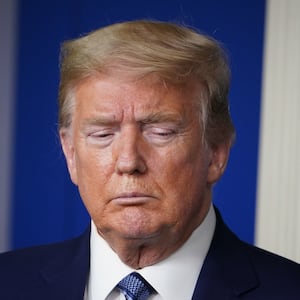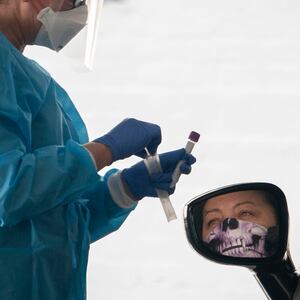The Food and Drug Administration on Friday issued a warning against prescribing hydroxychloroquine to patients infected with the deadly coronavirus outside of hospitals or clinical trials.
The drug, an anti-malarial medication that the FDA said causes heart risks that are too great to justify use on COVID-19 outside hospitals, has been repeatedly touted by President Donald Trump as a promising cure. The warning comes after “serious” poisoning and deaths were reported, the FDA said.
“The FDA is aware of reports of serious heart rhythm problems in patients with COVID-19 treated with hydroxychloroquine or chloroquine, often in combination with azithromycin,” the FDA wrote Friday. “We are also aware of the increased use of these medicines through outpatient prescriptions. Therefore, we would like to remind health care professionals and patients of the known risks associated with both hydroxychloroquine and chloroquine.”
The FDA previously authorized the emergency use of both drugs in clinical settings. Despite the risks, the federal agency said Friday that hydroxychloroquine can still be used in hospitals and clinical trials, but it was not immediately clear whether some future planned trials will be stopped after the warning.
Hydroxychloroquine, and the related compound chloroquine, are decades-old drugs commonly used to treat malaria and certain autoimmune diseases, including lupus and rheumatoid arthritis.
Cardiologists and public health officials across the country have previously warned of hydroxychloroquine’s heart risks and have taken a cautious approach to its use while politicians have praised the drug as a potential “game-changer” in the fight against the coronavirus.
The drugs are in clinical trials to examine their effectiveness in treating the virus widely, and preliminary results have been inconclusive.
“We will continue to investigate risks associated with the use of hydroxychloroquine and chloroquine for COVID-19 and communicate publicly when we have more information,” the agency wrote in the notice.
The warning comes a day after another potential coronavirus treatment, an antiviral drug called remdesivir, flopped its first trial by manufacturer Gilead Sciences. It failed to speed the improvement of patients with COVID-19 or prevent them from dying, according to preliminary results from the long-awaited clinical trial in China.
One French study found that hydroxychloroquine did not appear to help the immune system clear the coronavirus from the body. Two other small studies, in France and one in China, reported some benefits in the combination of hydroxychloroquine and azithromycin for COVID-19 patients who didn’t have severe symptoms.
Trump has long pushed the antiviral drug as a miracle cure that will solve the coronavirus pandemic in the United States. During one White House press briefing this month, Trump said the federal government had stockpiled 29 million doses to widely distribute to coronavirus patients.
“They’re not expensive. What do you have to lose?” Trump said at the April 3 briefing. “What do I know, I’m not a doctor. But I have common sense.”
On Tuesday, the president was also grilled about repeatedly touting hydroxychloroquine—even going so far as to say he’d try it—after a government-funded study showed it didn’t help veterans and was associated with more deaths. While the study has not been peer-reviewed, it was backed by the National Institutes of Health and the University of Virginia.
“I don’t know of the report,” he said at the daily briefing by the coronavirus task force. “Obviously there have been some very good reports and perhaps this one’s not a good report—but we’ll be looking at it.”
According to a Vanity Fair report on Friday, Trump’s political appointees previously pressured top U.S. health officials to widely distribute the chloroquine-based medications after the president started to praise the drug as a promising cure.
Brett Giroir, Trump’s COVID-19 testing czar, reportedly sent an email with the subject line “Hydroxychloroquine” to a high-profile group that included FEMA Administrator Pete Gaynor, HHS Assistant Secretary for Preparedness and Response Robert Kadlec, and Navy Rear Admiral John Polowczyk, who leads a supply-chain task force at FEMA, that read: “WH call. Really want to flood Ny and NJ with treatment courses. Hospitals have it. Sick out patients don’t. And can’t get. So go through distribution channels as we discussed. If we have 29 million perhaps send a few million ASAP? WH wants follow up in AM.”
Later, Giroir reportedly argued strongly against those who sought to limit the drugs to hospitals, stating that the drug that was approved and therefore should be the “final answer” in combating the pandemic.
The hype surrounding potential treatment drugs has already resulted in one American death. Last week, a New York woman with COVID-19 symptoms died after her family said a doctor prescribed her hydroxychloroquine and azithromycin without officially diagnosing her with the virus or testing if she had heart problems.
“Hydroxychloroquine and chloroquine can cause abnormal heart rhythms such as QT interval prolongation and a dangerously rapid heart rate called ventricular tachycardia,” the FDA said in its Friday warning. “These risks may increase when these medicines are combined with other medicines known to prolong the QT interval, including the antibiotic azithromycin, which is also being used in some COVID-19 patients without FDA approval for this condition. Patients who also have other health issues such as heart and kidney disease are likely to be at increased risk of these heart problems when receiving these medicines.”
The Centers for Disease Control and Prevention also pulled back on its guidance for using hydroxychloroquine to treat infected patients, and a National Institutes of Health panel of experts said doctors should not use hydroxychloroquine and azithromycin to treat the illness, stating there was not enough evidence to support the use of the potent drug.








